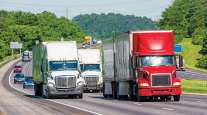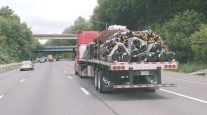State DOTs Seek National Freight Policy, Say Energy Transport Burdens Infrastructure
This story appears in the Jan. 19 print edition of Transport Topics.
WASHINGTON — State transportation leaders urged Congress to develop a national freight policy and pass a long-term transportation bill — soon.
They made their appeal at the Transportation Research Board’s annual meeting here Jan. 13.
“I think a reauthorization bill is imperative at this time. It’s a situation that we all know — continuing resolutions, extensions ad nauseam,” said Mike Patterson, director of the Oklahoma Department of Transportation. “It’s time that the federal government decides if it’s in or out of the transportation program. I think it’s time that it comes up with a new vision.”
Barbara Ivanov, freight systems director for the Washington Department of Transportation, also was exasperated.
“We cannot go after the Peter-Paul method, taking from existing programs that are fundamental to the infrastructure and the oper-ation of that infrastructure,” Ivanov said.
Mike King, secretary of the Kansas Department of Transportation, stressed the urgency for the need of a long-term transportation bill. “The U.S. needs a multiple-funding source. We cannot rely only on increasing the federal gas tax.”
King said he’s concerned that many members of Congress are reluctant to raise fuel taxes.
But to be successful, states need to be specific in their funding requests and should consider pitching regional and multi-modal transportation needs to their state congressional delegations, panel members said.
“It has to be what’s good for us, is good for Pennsylvania, good for Florida and good for Oklahoma,” King said. “There has to be that balance.”
The panel members also said they are facing infrastructure challenges related to the rapid growth of crude oil-production and transport in their states.
“The changing needs for energy transport are placing additional demands on the transportation system,” said John Cox, director of the Wyoming Department of Transportation. “New and expanding energy-sector developments — oil, natural gas, coal, wind, biofuels and solar — are occurring in numerous states throughout the U.S. Freight transport may double over the next 20 years.”
King said, the federal government should increase the weight limit for trucks on interstates.
“If we’re going to ask the freight community to pay more for fuel, let’s give them the ability to transport more freight,” King added.
Ivanov said her state was one of the top five most-effected states by the “complete restructuring of the crude-oil supply chain.”
Now our state’s source of oil is from the Bakken fields in the Midwest, trucked through Texas,” Ivanov said. “The infrastructure is just not there to manage that switch in capacity.”
Ivanov said there had been concern by some Washington communities that a volatile, flammable product is moving through their town and that their emergency responders are unprepared to adequately handle emergencies.
The shift of hazmat products by rail has created a need for improvements of at-grade crossings, but there has been no funding available for the improvements, she said.
Oklahoma’s Patterson said his state traditionally has been mostly a “pass-through traffic state” with the exception of one critical component — crude oil.
“We’ve had a tremendous increase in transportation of crude by rail,” Patterson said.
In Kansas, the growth of crude oil production has been more slow and steady than some other states, King said.
“We did give more money from the state level to the locals because most of the significant damage to the roadways was to county roadways,” King said.




